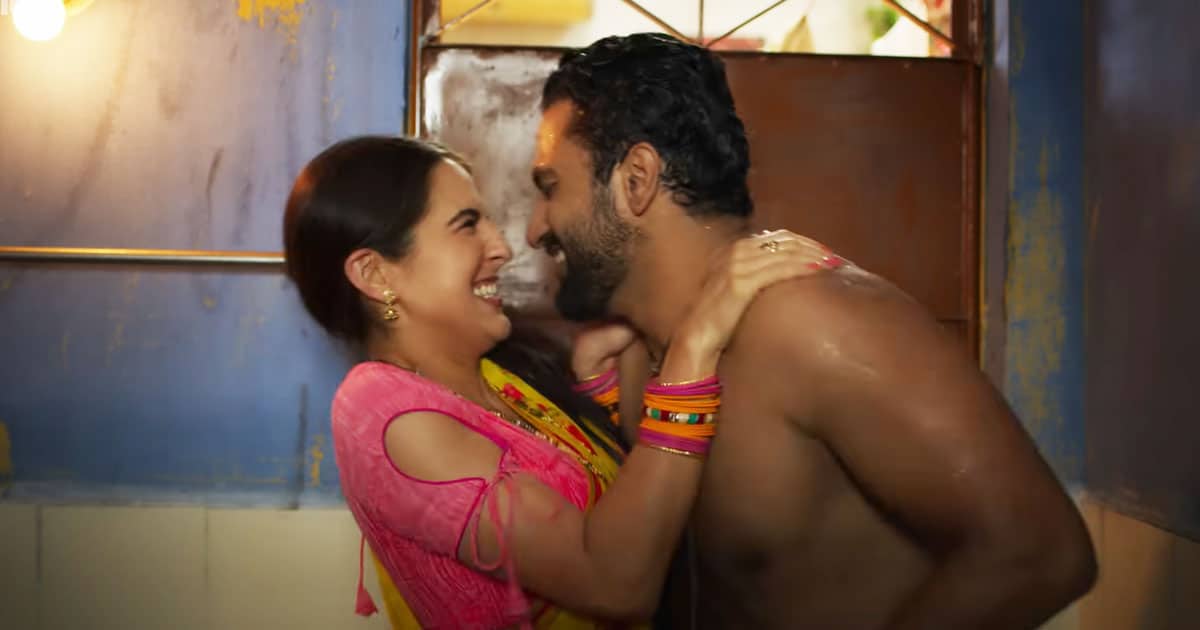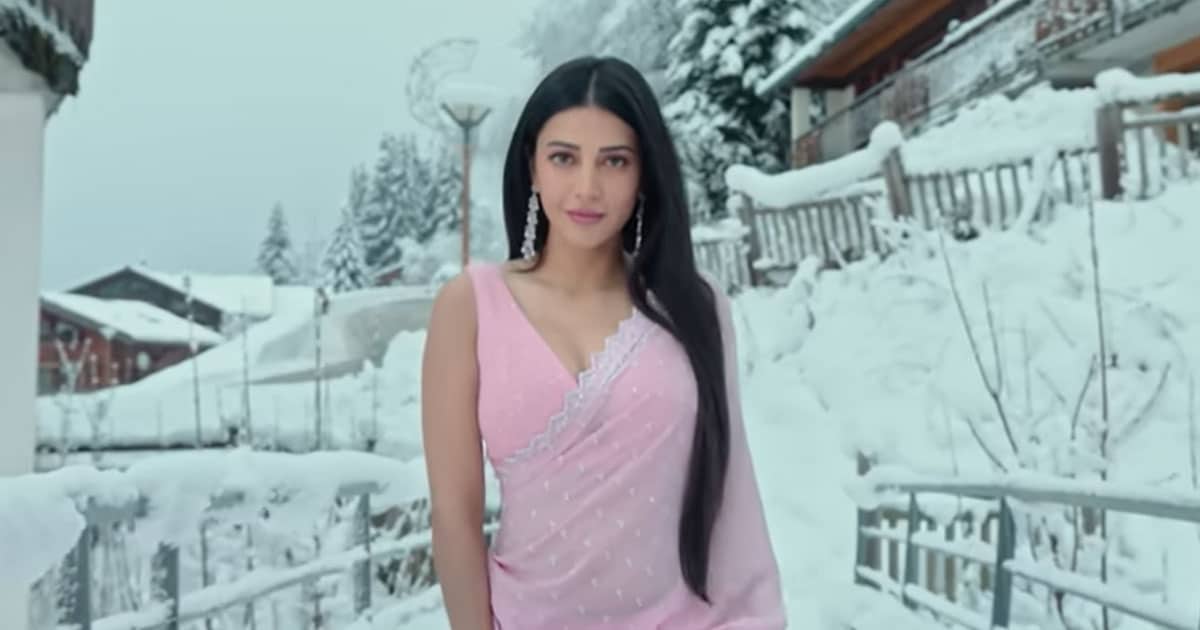“Kapil ke bajaaye Kappu kehna pasand karta hoon kyunki usmein do maatrayien bachti hai…do Thumbs Up ki bajaaye ek order karta hoon kyunki teri waali tasty lagti hai”
You might think that Kapil, oops Kappu, is a miser, but he is a middle-class man who, since childhood, understood the value of money and the means to save it. Thanks to mainstream Bollywood, somebody is talking about the Middle-Class in India. But how effectively they are doing it is debatable.
The Plot
Zara Hatke Zara Bachke starts with a wedding anniversary celebration that soon turns bitter over the anniversary cake because Haaye Ram! Andaa in it. This silly lapse of judgment on the part of “Bahuraani” leads to a quarrel in the joint family. This cake controversy was just a trigger point to the couple’s much griever situation.

Kapil Dubey (Vicky Kaushal), a yoga teacher, and Saumya Chawla (Sara Ali Khan), a chemistry professor, have been married for two years and live with their parents. Their happy married life takes a turn when Kapil’s nosy uncle and aunt move in with his family, creating a suffocating atmosphere. The couple decides to find a place outside the neighborhood to escape the intrusive relatives.
However, they soon discover that affording a flat within their budget is challenging. In their search for a solution, they come across a government housing scheme that could provide them with a home. To qualify for the scheme, they encounter Bhagwan Das (played by Inaamulhaq), a corrupt government official who suggests an unconventional solution- they must get a divorce.
Driven by their strong desire to have a home of their own, Kapil and Saumya reluctantly consider Bhagwan Das’s advice. This leads them down a comedic path filled with misunderstandings, humorous situations, and challenges. The couple embarks on a journey to navigate the complexities of the government scheme, all while pretending to be divorced.
Throughout the film, the plot explores the lengths to which Kapil and Saumya are willing to go to achieve their dream of having an entire roof over their heads. The comedic elements are intertwined with portraying middle-class aspirations and the struggles of young couples seeking independence from joint families.
Parallel Storylines and Social Commentary
Zara Hatke Zara Bachke shares a thematic similarity with Hindi Medium and Love Per Square Foot, as both films revolve around the desire to fit into a government scheme, leading to unexpected consequences. This parallel narrative structure allows viewers to draw comparisons and recognize the common thread of societal pressure and the struggle to conform.
Laxman Utekar’s association with Hindi Medium as a cinematographer adds an interesting layer to the similarities between the films. His prior experience in capturing the essence of similar themes and narrative arcs may have influenced the execution of Zara Hatke Zara Bachke.
Background Score and Comedic Timing
One of the notable drawbacks of Zara Hatke Zara Bachke lies in its background score, particularly in comic scenes. The film often relies on exaggerated and loud music cues to amplify the humor, which tends to overshadow the natural comic timing of the actors. This heavy-handed approach diminishes the impact of the comedic moments, as the background score becomes intrusive and disrupts the flow of the scenes.
Effective comedy relies on precise timing and subtlety, allowing the humor to emerge naturally from the situations and characters. Unfortunately, the film misses the mark in this aspect, relying more on forced humor and exaggerated reactions.
Logical Inconsistencies
Another aspect where Zara Hatke Zara Bachke falls short is its lack of logical coherence. The film presents a story that revolves around a young couple’s desire to have their own home and the hurdles they encounter along the way. However, the execution of the plot often disregards realistic portrayals and logical consistency.
For instance, the Zara Hatke Zara Bachke suggests that the couple should consider divorcing each other to fulfill the conditions of a government scheme, which seems like an extreme and illogical solution to their problem. While the film aims to maintain a lighthearted tone, it undermines the narrative’s credibility by resorting to implausible scenarios that strain the audience’s suspension of disbelief.
Furthermore, certain character decisions and plot developments lack a solid foundation and fail to provide satisfying explanations. These inconsistencies disrupt the story’s overall flow, creating a disjointed experience for the viewers.
Entertainment Value
Despite its flaws, Zara Hatke Zara Bachke manages to entertain with its light-hearted and relatable premise. The film taps into the universal desire for independence and a place to call home, resonating with the audience on an emotional level.
Small little nuances and struggles of a middle-class family in a Tier 2 city are well captured. How the newly adjusting couple shares their insecurities and resolve their problems by sharing “5-Star” chocolate in a bedroom somewhat reminds us of the opening sequence of Jay Bhadhuri’s starrer Piya Ka Ghar.
The chemistry between Sara Ali Khan and Vicky Kaushal adds charm and likability to the film, enabling viewers to invest in the journey of the central characters.
Additionally, Zara Hatke Zara Bachke does succeed in delivering moments of laughter and amusement, albeit marred by the aforementioned issues with comedic timing and logic. The light-hearted approach and the cast’s performances contribute to the overall entertainment value, allowing the audience to enjoy specific comedic sequences despite their flaws.
Supporting Cast and Memorable Performances
The supporting cast of Zara Hatke Zara Bachke delivers impressive performances, bringing depth and authenticity to their respective characters. Akash Khurana’s portrayal of a middle-class father is a refreshing departure from his usual typecast roles as a political figure or business magnate. Sharib Hashmi’s portrayal as a security guard reminds us of Deepak Dobriyal’s character in Tanu Weds Manu.
However, Kanupriya Pandit as Deepa Mami steals the show with her conniving yet endearing character. Deepa Mami effortlessly injects caste and social status into family conversations, creating both tension and comic relief. Pandit’s nuanced performance balances mischief and charm, leaving a lasting impression on the audience.
Rakesh Bedi’s portrayal of the father-in-law, who imparts crucial life lessons after a few pegs, adds a layer of wisdom and humor to Zara Hatke Zara Bachke‘s narrative. Bedi’s experience and skill as an actor shine through, infusing the character with warmth and depth.
While Zara Hatke Zara Bachke may not offer groundbreaking storytelling, it remains quite watchable due to its comedic elements and the relatability of the central theme. The film navigates the challenges faced by young couples with a light-hearted approach; mixing comedy with social commentary makes it a family film, even if it falls short of being a standout masterpiece.



